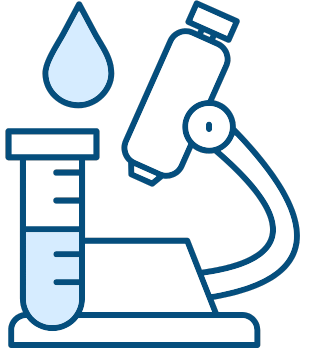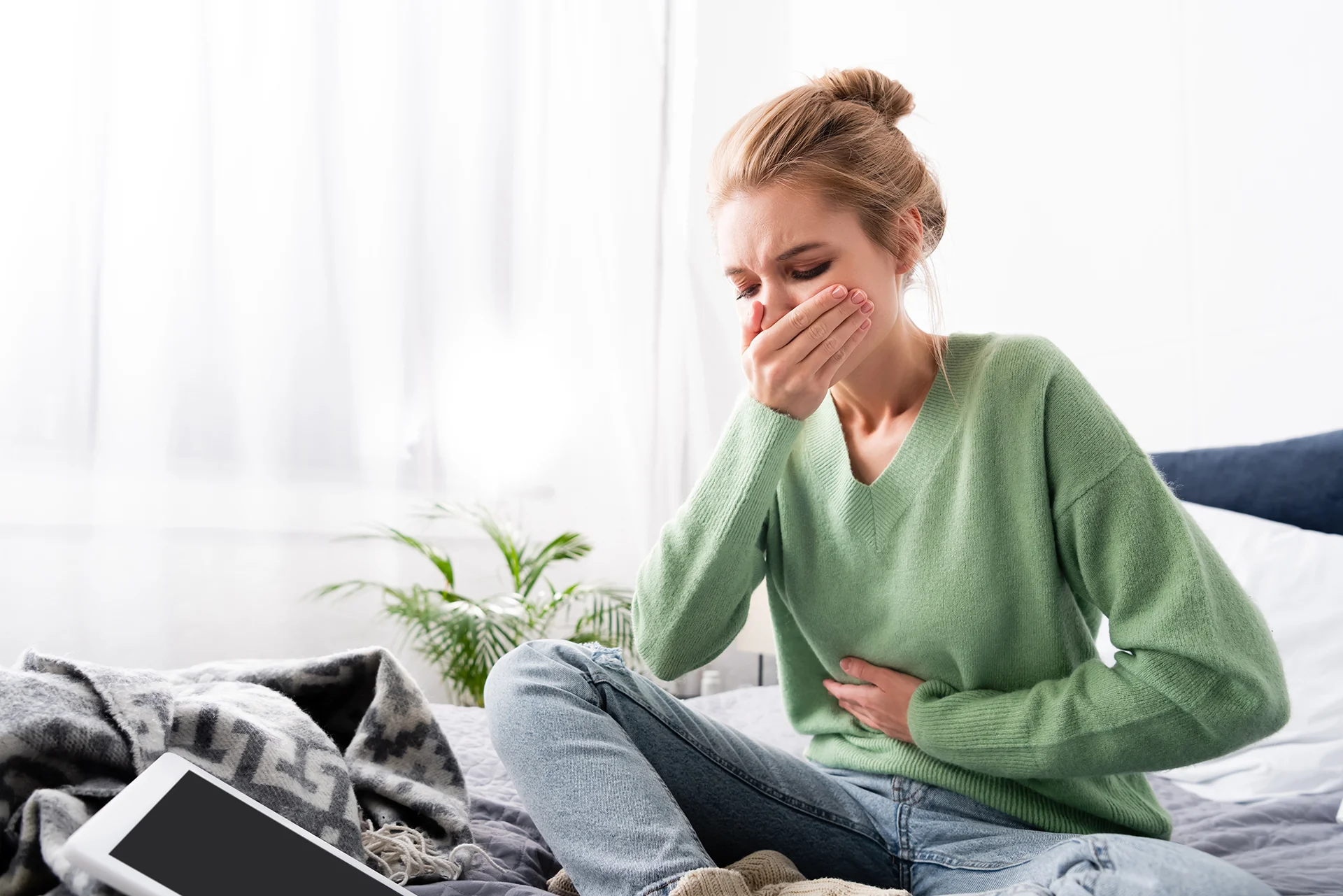What does nausea betray? Ways to help yourself
It’s hard to deny – nausea is a very unpleasant problem. Nausea is accompanied by weakness, often accompanied by cold sweat, slow pulse, low blood pressure, pale skin and increased salivation. Nausea and vomiting are complex processes involving both the central nervous system and the hormonal regulatory system. Nausea can have a variety of causes and can accompany many health problems. Although nausea is usually harmless and can pass on its own, sometimes it is a sign of a serious illness and requires urgent attention. In this article, together with Drops Clinic’s expert doctors, we will discuss the most common causes of nausea and ways to reduce this discomfort – so that you always feel great.
Nausea and its causes
There can be many different reasons why we feel nauseous. Nausea can be caused by a variety of physiological and psychological factors, as well as by viral illnesses, but some causes are more common than others. To understand why you feel nauseous, it is important to take into account the course of the previous day – what you have eaten and drunk, as well as other factors such as the possibility of pregnancy or illness, allergies.
Here are some of the most common reasons why we may feel nauseous:
Food poisoning
Eating food that is spoiled or contaminated with certain micro-organisms can lead to an infection in the body – food poisoning. In such cases, we usually experience not only nausea and vomiting, but also diarrhoea, general weakness and abdominal pain.
Food poisoning is very dangerous because it usually leads to intense vomiting or diarrhoea, resulting in a loss of fluid, dehydration and electrolyte imbalances. Food poisoning and constant vomiting leads to a loss of appetite and an unwillingness to eat or drink anything at all. It is very important not to overload the body when eliminating an infection. Therefore, if a person does not want to eat or drink, they should do so and only start eating and drinking when they feel like it.
In the event of food poisoning, it is important to go to a doctor or emergency centre as soon as possible, especially if nausea is accompanied by fever, blood in the stool or severe abdominal pain.
Food allergy
The most common symptoms of certain food allergies are skin rashes, itching, swelling or breathing problems. However, sometimes an allergic reaction can also cause nausea or vomiting, abdominal discomfort and pain. This is a reaction of the immune system to certain foods that the body considers foreign and dangerous. A food allergy can be life-threatening because of the risk of anaphylactic shock. Therefore, if you suspect an allergy and you experience difficulty breathing or shortness of breath accompanied by nausea, you should immediately contact your doctor or the emergency services.
Incorrect use of vitamins or food supplements
Vitamins and food supplements are good for your health, but only if they are taken properly and according to your doctor’s recommendations.
Taking too high a dose or the wrong combination of supplements can lead to side effects, one of the symptoms of which is nausea. For example, too much iron, zinc or magnesium can irritate the stomach and cause nausea and vomiting.
Some other supplements can irritate the stomach lining or cause excessive acidity and abdominal pain. Therefore, follow your doctor’s instructions and take vitamins or food supplements only with or after meals to avoid irritating your stomach. If symptoms persist, you should review the dosage and composition of the products you are taking with the help of your doctor. .
Stress and anxiety
Stress, anxiety and psychological tension can affect the physiological state of the body and thus the gastrointestinal tract, causing nausea or vomiting. When a person is anxious or stressed, stress hormones are released in the body which can affect the digestive system and cause nausea. Stress hormones send danger signals to the body and nausea is the body’s way of purging itself of unwanted substances or emotions.
Stress and anxiety can also suppress appetite and disrupt the normal digestive processes of food. Abdominal pain, diarrhoea or constipation may also occur. Nausea caused by stress and anxiety can be alleviated by relaxation techniques, breathing exercises, meditation or counselling with a psychologist.
Nausea in pregnant women
Nausea is one of the best-known symptoms of pregnancy. It is a sign of early toxicosis, usually in the morning or on an empty stomach. Nausea in pregnancy is caused by hormonal changes, increased progesterone levels and increased sensitivity to smells. Nausea in pregnancy usually occurs between 6 and 12 weeks of pregnancy and disappears after the first trimester, but can sometimes last longer.
Although morning sickness usually does not cause serious complications, it can seriously impair a pregnant woman’s well-being and quality of life. Nausea in pregnancy can be alleviated by avoiding an empty stomach, eating smaller but more frequent meals, avoiding fatty, spicy or hard-to-digest foods, and drinking enough fluids. If the nausea is very severe and interferes with eating or drinking, a doctor should be consulted as there is a risk of dehydration..
Drinking alcohol in moderation
Alcohol is a toxic substance that affects the central nervous and digestive systems. When too much alcohol is drunk, the body tries to eliminate it by vomiting. Alcohol also irritates the lining of the stomach and inhibits stomach activity, which makes food take longer to digest. Alcohol causes dehydration and electrolyte imbalances, which can also cause nausea. Alcohol-induced nausea can be alleviated by drinking plenty of water or isotonic drinks, eating light foods (bananas, crackers) and taking activated charcoal. However, the best way to avoid alcohol-induced nausea is to drink alcohol in moderation.
Viral diseases
Various viral diseases can also cause nausea. The main symptoms of rotavirus or noro virus are nausea, diarrhoea and vomiting.
Rotavirus, norovirus and similar viral infections are highly contagious, usually spread by the faecal-oral, droplet route. Such viral infections are highly resistant to disinfectants, so the best way to protect yourself is through good personal hygiene. To protect yourself from the roto or noro virus, you should wash your hands regularly and properly with soap and water, especially before eating, after using the toilet or after contact with sick people. It is also important to wash food properly and to disinfect common surfaces regularly.
If one or more members of a family farm have contracted rotavirus or a similar viral disease, proper isolation of the sick person from other persons is also very important, as there is a high risk of infection. The sick person should stay at home and, if there are other persons living in the house, the sick person should be isolated in a separate room to limit contact with other family members. The patient should use separate utensils, towels and other personal items, and ventilate the room regularly to prevent transmission of the virus. In the absence of a separate bathroom and toilet room, this should be cleaned regularly and properly.
If you notice symptoms that indicate a roto, noro or other viral infection of this type, it is important to seek medical attention immediately. If left untreated, these infections can quickly progress, within 3-4 days, to bacterial illnesses or infections requiring antibiotic treatment.
our serviceWays to reduce nausea
The constant feeling of nausea can be very annoying and interfere with normal life. However, there are several ways in which you can relieve your nausea and improve your quality of life. Here are some of them:
Intravenous therapy
Intravenous therapy is a technique where drugs and fluids are dripped directly into a vein through a catheter. It is an excellent way to quickly and effectively treat diseases and problems that cause nausea or vomiting, as well as their other symptoms. In the case of viral illnesses, nausea and vomiting are often accompanied by other symptoms such as fever, chills and abdominal pain. In this case, treatment with conventional medicines is difficult because conventional tablets do not stay in the stomach long enough to work because of nausea and vomiting. In this case, intravenous therapy is an effective way to treat infections.
With persistent nausea and vomiting, the sufferer’s appetite disappears, and there is a reluctance or even fear of eating or drinking anything. During intravenous therapy, the person is then injected with a variety of drugs to ensure that the body receives sufficient nutrients, does not become completely fatigued and has enough energy to fight the infection. Intravenous therapy also helps to quickly restore dehydration, an imbalance of fluids and electrolytes in the body caused by infections and vomiting or diarrhoea. Therapy can also help remove toxins from the blood and improve general wellbeing.
Intravenous therapy is a safe and effective way to relieve nausea in the case of various viral infections, food poisoning or even alcohol misuse.
Find out more about intravenous therapy here.
Medicinal preparations
Prescription or over-the-counter anti-nausea and anti-vomiting medicines are available in pharmacies. These drugs act on the central nervous system and inhibit the nausea reflex. They may be useful in case of swinging sickness, during pregnancy or after chemotherapy. However, they should only be taken as prescribed by your doctor and are not recommended for long periods of time.
Natural remedies and other methods
There are many natural remedies, or simple ones, that can make you feel better and relieve nausea for a short time.
- Ginger. Ginger is one of the most popular and oldest natural remedies for nausea. It has antispasmodic effects and helps to calm the stomach and reduce muscle contractions in the digestive tract. Ginger also helps to regulate the levels of serotonin and substance P in the body, which are linked to feelings of nausea.
Consumption: ginger can be consumed in a variety of ways: drinking ginger tea, chewing dried ginger pieces, taking ginger capsules or syrups. Ginger is safe and effective for many people, but caution should be exercised when using it for bleeding disorders, pregnancy or when taking certain medications.
- Peppermint. Peppermint is another natural remedy with a nausea-reducing effect. It acts as an antispasmodic and sedative agent that relaxes the muscles of the stomach and intestines and relieves discomfort. Peppermint also has a refreshing and pleasant aroma that can help distract from persistent nausea.Peppermint can be used as a tea, essential oil or as a paste.
Use: Peppermint tea is easy to prepare: pour boiling water over the peppermint leaves and leave to brew for 5-10 minutes. Peppermint essential oil can be dripped on cotton wool or a towel to inhale the aroma, or applied to the chest or belly. Peppermint is safe and effective for many people, but should be used with caution in the presence of heartburn, as it can worsen symptoms.
- Daisies. Chamomile is one of the most popular and oldest herbs used to treat digestive disorders. Chamomile has anti-inflammatory, antispasmodic and calming effects, which help to soothe the lining of the stomach and intestines and reduce discomfort. Chamomile can also help reduce nausea caused by stress and anxiety.
To use: chamomile can be consumed as a tea, which is easy to prepare by pouring boiling water over the chamomile flowers and letting it brew for 5-10 minutes.
- Lemon. Lemon is a very good source of vitamin C and is excellent for flushing out toxins from the body. However, medical studies have shown that lemon is an excellent remedy for nausea. Even the smell of lemon is a great relief from nausea.
To use: if you feel nauseous, try cutting the top off a lemon and inhaling the aroma a couple of times. You can also squeeze some lemon juice into water and drink it.
- Other means and methods. If you don’t have any of the natural remedies listed above, there are a few other ways to temporarily relieve the feeling of nausea. One of these is alcohol-rich remedies. If you start to feel nauseous, you can take a sniff of a disinfectant liquid or other product with a high percentage of alcohol. And if you don’t have anything like that to hand, a simple exercise will help – lower your head as low as possible and hold this position for at least 5 minutes. This will make you feel better for a while.
When should I go to the doctors?
Although most nausea is harmless and can go away on its own, it can sometimes be a sign of a serious illness, or can develop into a serious illness if left untreated. It is therefore always a good idea to seek medical attention when nausea occurs to prevent the disease from progressing. Contact your doctor or an emergency centre immediately if:
- persistent nausea lasting more than 48 hours;
- the nausea is accompanied by severe abdominal pain, fever, bloody stools or dizziness;
- accompanied by shortness of breath or difficulty breathing;
- the nausea is associated with head trauma, stroke or brain infection;
- nausea associated with liver, pancreas or gallbladder disease;
- nausea associated with chemotherapy, radiotherapy or other drugs;
- vomiting blood, taste of blood in the mouth;
- the nausea is very severe and interferes with eating or drinking;
- nausea is associated with pregnancy and causes weight loss or dehydration.
Nausea is an unpleasant problem, and although it usually does not cause serious complications, it can seriously impair our well-being and quality of life. Nausea can often be completely harmless and go away on its own. Sometimes, however, it is a sign of a serious illness and, if left untreated, can develop into a serious infectious disease requiring urgent medical intervention and antibiotic treatment. If you are suffering from a strong, constant feeling of nausea that prevents you from eating or drinking, or if you are experiencing additional symptoms, contact the specialist doctors at Drops Clinic who will help you to alleviate the discomfort so that you can feel great.




